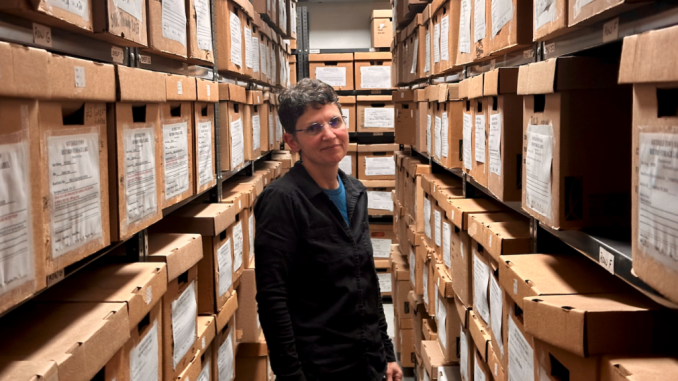
For 20 years now, Southold Town records management assistant Stacey Norklun has been preserving the past and streamlining the present with a massive digitization project that officials say has revolutionized the work flow in Town Hall.
Beyond digitizing town records, Ms. Norklun is also responsible for Freedom of Information Law requests, keeping the town in line with state document retention and disposal laws and organizing and maintaining an archive of videos of town meetings and hearings.
Town Clerk Denis Noncarrow said in an interview last week that his records management assistant’s contribution to a smoother workflow throughout Town Hall has been “massive.
“This young lady is incredible, just absolutely incredible,” he said of Ms. Norklun. “She just comes in and she puts her head down day after day and sometimes you don’t even notice she’s there, she’s so quiet about her work. But what she’s done to coordinate [record keeping] is absolutely amazing.”
Prior to Ms. Norklun’s arrival, the town’s antiquated paper filing system was slow, laborious and flawed, according to longtime Deputy Town Clerk Lynda Rudder.
Back then, “I spent a lot of time in the basement, pulling folders,” she said. “We do have a list of where things are stored down there, but finding them is a whole different thing. Until Stacey got here. Now you can go over there and ask her for anything and within an hour she’ll bring back the original.
“When you can’t find something, she’s willing to go the extra mile to get it,” Ms. Rudder said. “She comes in early. She leaves late and she’s sometimes here on weekends.”

Nicholas Planamento, a real estate agent and a member of the Southold Town Zoning Board of Appeals, said Ms. Norklun’s work as a pioneer of a paperless future has created a “different world” for anyone dealing with any of the town’s numerous departments.
“Today, almost everything is accessible online on the town website, which is phenomenal — it makes my life so much easier as a real estate agent. But for any town person — just to research anything they might need to know — it’s all accessible, document wise, historically, I have to tell you, and this is a different world.”
Before digitization, Mr. Planamento remembers filling out Freedom on Information Law requests for public records by hand.
“The FOIL form was always filled out manually. So you’d have to, for instance, go to the assessor’s office, fill out a form at the assessor’s office, walk it over to the [town] clerk, and have it stamped that they received the Freedom of Information request. They’d make a copy of it, and then you’d go back to the assessor’s office to get the documents you want. It was just a nightmare of paperwork.”
He said that digitizing public property records streamlined the work of any real estate agent working in Southold.
“When I go on a listing appointment, I can pull up documents instantaneously from Southold to get an overview, a snapshot, of what’s going on with the property before I walk in, which is hugely valuable.”
Mr. Noncarrow said the “boxes from different departments pile up quickly and she doesn’t like to fall behind, so you’ll see her here on a Saturday — just quietly doing her job. She’s just really incredible.”
For the last six to eight months, Ms. Norklun has been invested in a massive project to digitize the town police department’s records.
“They have a storage room that’s three or four filing cabinets tall, and they’ve been shipping them over here in boxes and she’s been scanning them in,” Ms. Rudder said.

For local history buffs, Ms. Norklun’s most valuable contribution is bringing the history of Southold alive by digitizing and publishing on the Southold Town website a treasure trove of historical documents stretching from the town’s founding in 1640 through World War II.
Among the fascinating records are copies of the original document establishing Southold Town and a mid-17th century deed book. There’s an “earmark” book from the early 1800s, in which local farmers record the distinctive ‘marks’ they’ve cut into their livestock’s ear to identify them as their property. There is a book of slave manumissions, records of individual owners freeing specific slaves that stretches from 1795 to 1837.
There are Civil War era letters and an 1865 war enlistment book, a 35-page World War I list of local men enlisted in a state militia. The most extensive records digitized are those surrounding World War II, including records from the Shelter Island War Council, aluminum scrap collection memos, air raid alert instructions — including special instructions for doctors making emergency calls at night.

Mr. Planamento, who said he still recalls the days when requesting documents cost 25 cents a page, said Ms. Norklun’s work is a win-win for the town and the community.
“It’s a savings on paper, on toner on all kinds of other things. And while one might think it’s a cumbersome or an exhaustive or even an expensive task to have somebody dealing with all these things, the management of the records, I think, are paramount to a community.
“Whether it’s a historical record for genealogists, or if you just want to learn more about your individual home, you have everything right there online.
“For Southold, I think we’re light years ahead of other communities.”
In an interview, Ms. Norklun was humble and unassuming about her work.
“I’m a big reader,” she said. “I’ve loved to read my whole life, fiction mostly. But I just love keeping track of what we have, and making sure it’s there for everybody.”

